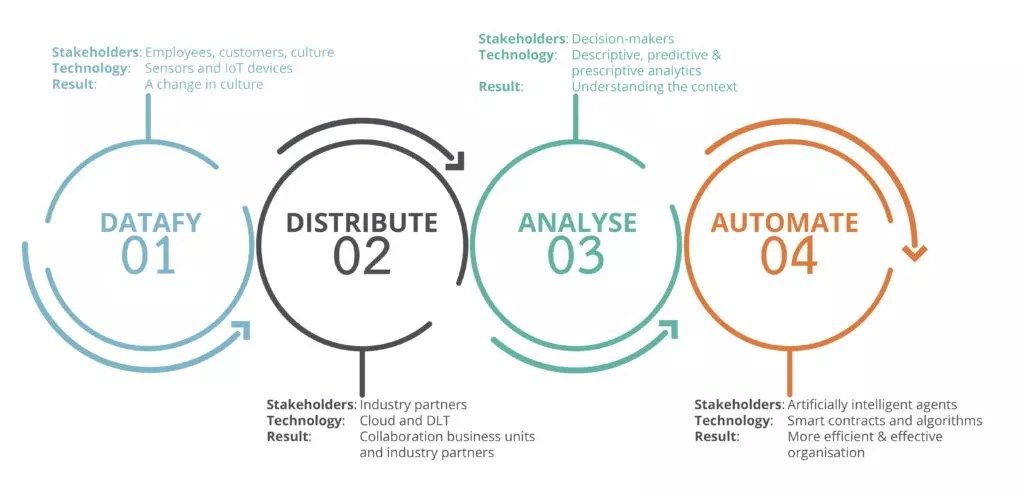The Organisation of Tomorrow – Available Now!

Earlier this year, I completed my PhD at the University of Technology Sydney. My research focused on how do emerging information technologies change the interaction of organisations and technologies. The title of my research was: Sociomateriality in the age of Emerging Information Technologies: How big data analytics, blockchain and artificial intelligence affect organisations.
Undertaking a PhD was a great experience and an intellectual challenge. However, academic dissertations are dry and difficult to read. Therefore, I turned my thesis into an easy-to-read-and-digest management book, which turned out to be a journey in itself.
The objective of this book is to help organisations prepare for the exponential times we live in. Organisations that want to remain competitive in a changing environment, need to anticipate shifting behaviours of stakeholders and technologies. This book offers organisations a blueprint for how to adapt to these rapidly changing times by introducing a new model, the D2 + A2 Model.
The D2 + A2 Model
The D2 + A2 Model, based on years of research, offers organisations a new approach to turn their existing organisation into a data business. It will help organisations to be ready for the data-driven and exponentially-changing society that is upon us.

Figure 1: The D2 + A2 model
This D2 + A2 model consists of several actions, stakeholders and required technologies that will help you prepare your organisation for tomorrow. It is based around the notion that organisations need to datafy their processes and customer touchpoints. This will provide them with the required data to understand their environment and take actions when required. The next step is to distribute the data, either through the cloud (when the data is only used internally) or using blockchain (to enable trustless collaboration with industry partners). The third step is to analyse the data using descriptive, predictive or prescriptive analytics. This will offer organisations the right insights and prepare the business for upcoming unknown unknowns. It will also empower your employees and improve decision-making. The final step is to automate your processes with artificial intelligence and smart contracts to prepare your organisation for the data-driven future.
The objective is to use data to deliver an optimal customer experience. After all, if you take care of your customers, your customers will take care of your shareholders.
Data at the Heart of the Organisation of Tomorrow
Data collection can help every aspect of your business from developing new products to improving operational efficiency. Companies that use customer intelligence have better marketing results. Organisations that use data collected after a customer buys a product can make better recommendations based on usage.
Internally, data collection can improve your supply chain or help with recruiting talent. By collecting millions of data points, you provide your business with the information needed to drive strategic thinking and overcome internal roadblocks. You can collect information on everything from the amount of time it takes to pull and ship an order to the best delivery routes and average wait times for customers. This information can also be used to assess employee performance (of course, with the right privacy measures in place). Data leads to knowledge which ultimately drives decision making.
However, collecting data as this scale also requires ethical behaviour. Organisations should be transparent, so that consumers know what will be done with the data that is collected, today and in the future. They should keep their communication simple and understandable, so that everyone, including digital immigrants, understands what’s being done with the data. All data should be well-secured and encrypted, although distributed ledger technology will enable highly secure data, non-decentralised data remains receptible for hackers. Where data is collected, hackers will be active, and any organisation should assume that they can and will be hacked. Finally, privacy should be part of the DNA, so that all employees understand the importance of it.
Preparing for Tomorrow: The Data Organisation
The key message underlying this book is that data-driven organisations that incorporate big data analytics, blockchain and AI will stand the best chance to remain competitive in the future.
When these emerging information technologies converge, a gestalt shift will occur; all of a sudden, we can see the world through a different, more technologically advanced, lens. This opens up a completely new perspective, where we see the organisation, and the society, as a data organisation.
The convergence of technologies will offer new possibilities and solutions to improve our lives and create better organisations and societies, with data at the heart of it. However, such data-driven organisations cannot function without humans in the loop as organisations remain social entities.
Therefore, to turn your existing organisation into a data organisation, there is a lot of work to be done. It means that you should datafy your processes, distribute your data via the cloud or using distributed ledger technologies, analyse your data using analytics to sense and seize opportunities and automate your decision-making using AI and smart contracts. In each of these steps, you should take into account ethical guidelines to ensure that you respect your employees’ and customers’ privacy and security. When doing so, you will become a data organisation that is ready for the fast-changing data-driven future ahead of us.
You can read a preview of the book here, read all editorial reviews here and you can purchase the book here. If you have read the book, a review on Amazon or another platform would be much appreciated, thanks!









